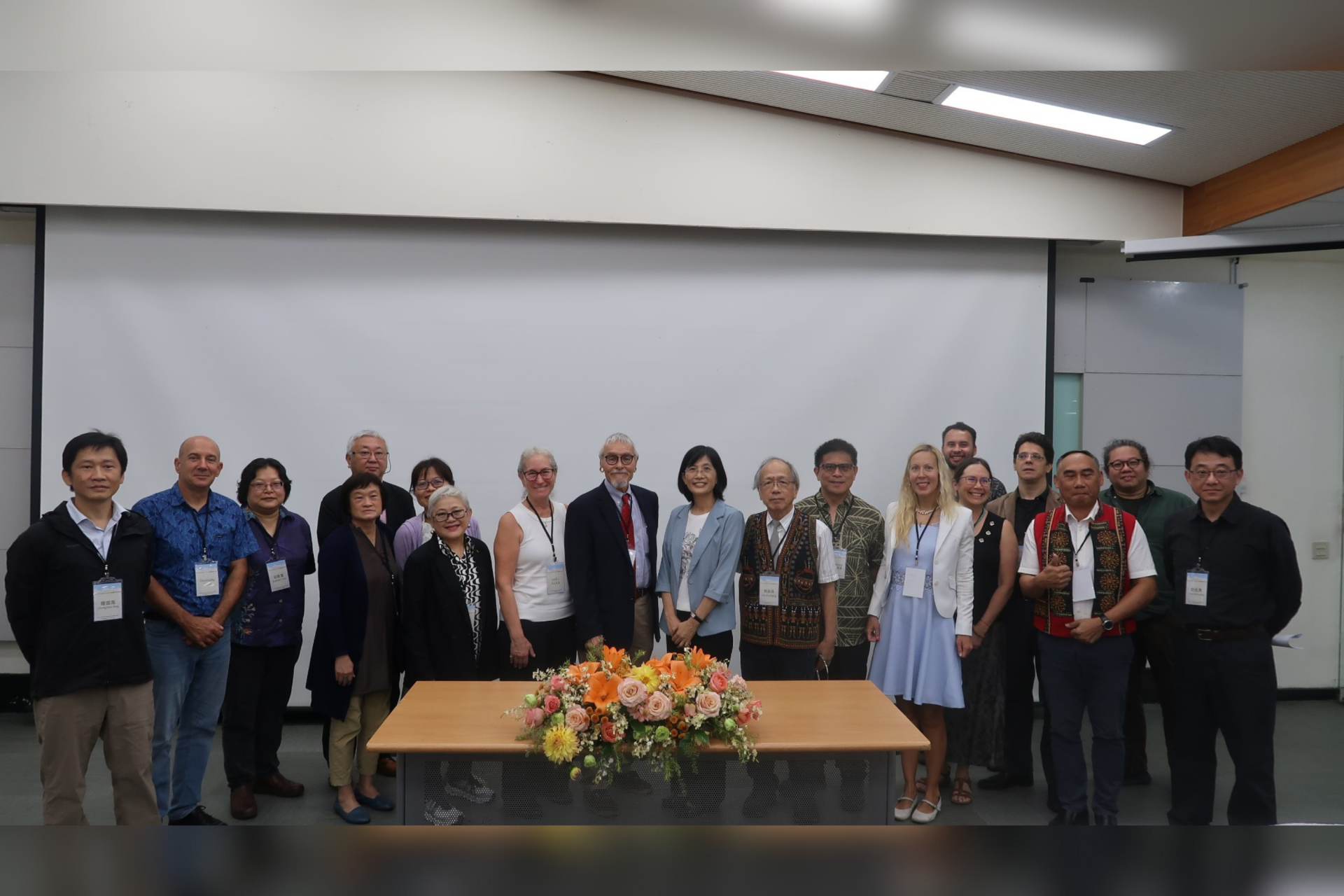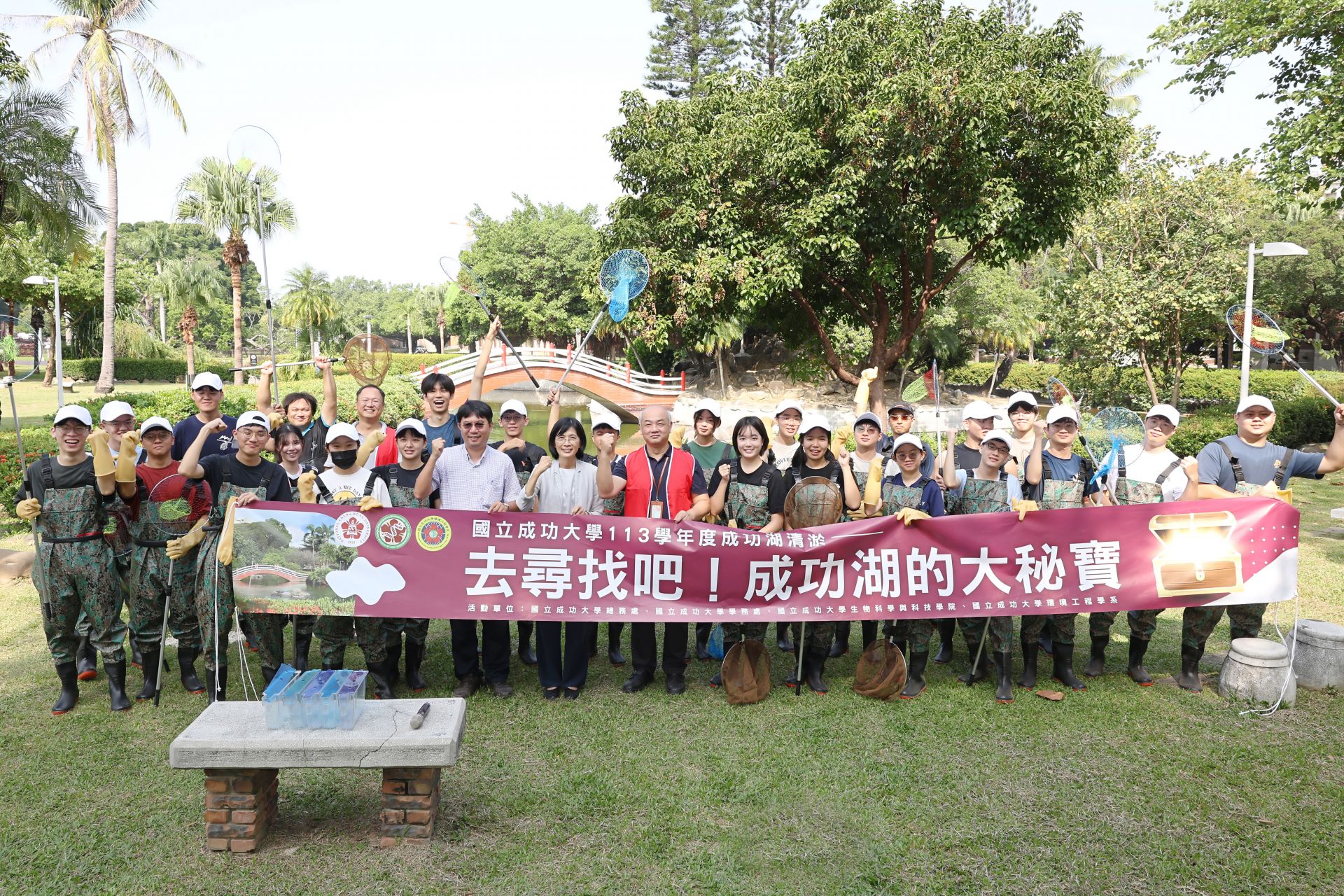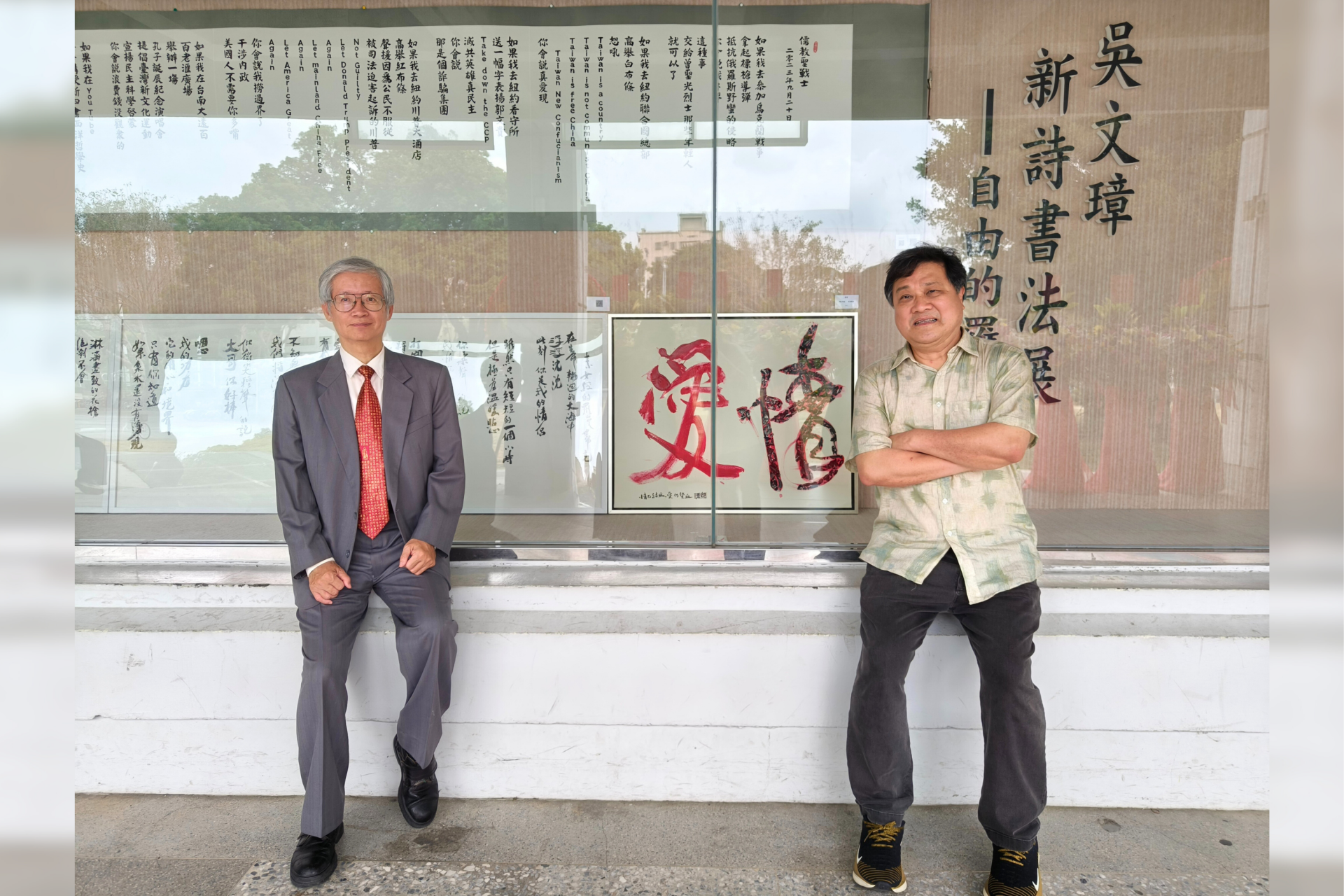Professor Chao-Ching Fu, Emeritus Professor of the Department of Architecture at National Cheng Kung University (NCKU), has long advocated for cultural heritage preservation with a "rational and moderate" approach. He has dedicated himself to aligning Taiwan's practices with international standards and integrating community efforts to embed the concept of heritage preservation into the general public. For 41 years, he has tirelessly contributed to this cause and has been awarded the highest honor in the cultural sector, the 43rd Executive Yuan Cultural Award. Professor Chao-Ching Fu expressed gratitude for the recognition of his longstanding beliefs and perseverance, and he plans to continue his work, hoping that more cultural heritage professionals will participate in international organizations, stay abreast of new trends, and promote a healthier and more sustainable preservation of Taiwan's cultural assets.
Born and raised in the ancient capital of Tainan, surrounded by old buildings, Professor Chao-Ching Fu developed a deep, indescribable affection for these structures from a young age. As a sophomore, he interned at an architectural firm near the original site of Lin An Tai Historical House in Taipei’s Daan District. There, he personally witnessed the imminent demolition of the house due to the widening of Dunhua South Road, which sparked widespread public discussion and controversy, eventually leading to the creation of Taiwan's Cultural Heritage Preservation Act. "It was probably around that time that I began to think about doing something for cultural heritage preservation," Professor Fu recalled.
After joining the faculty at NCKU’s Department of Architecture, he began investigating old buildings throughout Taiwan and established the "Scale Studio," inviting interested students to join his research. In 1985, he self-published the book "Anping Architecture," distributing it for free to libraries, organizations focused on heritage preservation, and friends. Professor Fu revealed that the cost of publishing the book was around 90,000 NTD, at a time when his monthly salary was only 9,000 NTD, indicating his deep dedication and passion for cultural heritage preservation. As a teacher at NCKU, his involvement in preservation efforts grew increasingly extensive, leveraging the university's resources to expand his contributions.
Reflecting on his journey, Professor Chao-Ching Fu lamented that many people in Taiwan still hold outdated views on heritage preservation and restoration, believing that preservation must be like antique conservation, with no changes allowed. Internationally, old houses are often integrated into daily life and actively used. UNESCO proposed in 2022 that cultural heritage should embrace innovation, resilience (gaining acceptance from contemporary society), humanity (respecting the wishes of property owners), and diverse development.
The National Museum of Taiwan Literature, located in Tainan’s West Central District near Tang Dezhang Roundabout, is a building from the Japanese colonial period. When it was converted into the Museum of Taiwan Literature, a new structure was added behind the main building. Professors Chao-Ching Fu and Hsu Ming-Fu from NCKU’s Department of Architecture both advocated for the demolition of three old structures—a restroom, an air raid shelter, and a bicycle shed—based on overall planning considerations, which initially sparked waves of criticism accusing them of destroying heritage sites. Fortunately, their proposal was eventually accepted, enabling the museum’s current success.
Professor Chao-Ching Fu has consistently maintained that old buildings, including cultural assets and historic sites, cannot fully meet modern society’s needs. If modifications are made to remove parts that do not align with contemporary requirements, old structures can better integrate into today’s life and thus endure longer and more meaningfully. He argues that if nothing can be altered and everything must remain as it was, the room for urban development and progress would be minuscule.
He also questions why some heritage preservationists in Taiwan hold the peculiar notion of "destroying contemporary memories to nostalgically restore old buildings that do not exist in living memory." Professor Fu cites the Tainan Art Museum Building 2 as an example. The site was a Shinto shrine during the Japanese colonial period, and during the construction of Building 2, some advocated for its restoration to a shrine. However, almost no one alive today has any memory of that shrine. To Professor Fu, restoring the past based on old photos out of nostalgia is false restoration, not genuine preservation.
To help domestic audiences understand new trends in international heritage preservation, Professor Chao-Ching Fu translated UNESCO’s heritage preservation guidelines into Chinese, producing the book "International Principles of Preservation and Restoration of Historical Monuments" in 2002. This was the first comprehensive and professional translation of international heritage preservation regulations in Taiwan. However, despite years passing, the general understanding of cultural heritage preservation in Taiwanese society still lags behind the international community by at least a decade. Although the Cultural Heritage Preservation Act, implemented in 1982, has seen amendments over the years, it remains fundamentally a 40-year-old framework, and significant enhancements are needed to align it with international standards.
Since 2003, Professor Chao-Ching Fu has taken graduate students to attend the International Council on Monuments and Sites (ICOMOS) conferences at UNESCO, presenting papers at his own expense. In 2011, he overcame diplomatic barriers to attend under Taiwan’s name, showcasing Taiwan’s achievements in heritage preservation. He expressed satisfaction that what began with just him and his students has now expanded to include over ten faculty and students from various Taiwanese universities participating in these conferences, including NCKU’s Assistant Vice President Bing-Sheng Wu and Professor Hui-Wen Lin from the Institute of Creative Industries Design. He hopes that more scholars and experts in Taiwan’s heritage field will participate in international conferences and align with global standards.
Over 41 years of dedication to heritage preservation, Professor Chao-Ching Fu’s rational stance—that cultural assets can be reused, modified, and supplemented with new elements—has often met with intense criticism, leading to feelings of frustration and disappointment. However, he reflects that without such persistence, Taiwan, as a non-member of the United Nations, might drift further away from international perspectives on cultural heritage preservation.
Looking back, Professor Fu takes the most pride in the collaborative project between NCKU and Matsu to repurpose military sites through the "Battlefield Transformation and Regeneration" initiative. In 2007, he began researching Matsu’s battlefield cultural landscape. Supported by NCKU’s Department of Architecture and College of Planning and Design, his team worked on documenting, interpreting, designing, revitalizing, and regenerating the gradually disappearing military sites. This effort not only preserved Matsu’s cultural heritage but also integrated it into contemporary life, earning local recognition and the "University Social Responsibility Award" from "Global Views" magazine.
Beyond his academic research, teaching, and involvement in public and private sector heritage preservation affairs, Professor Chao-Ching Fu has actively promoted heritage preservation concepts among the general public. He founded the Tainan Cultural Heritage Preservation Association, organized numerous cultural activities and exhibitions, and became the first NCKU professor to teach public courses. Twenty years ago, he began giving lectures at various locations, including Eslite Bookstore in Taipei, averaging 50 public lectures annually over the past decade.
Receiving the Executive Yuan Cultural Award, the highest cultural honor in Taiwan for lifetime cultural achievement, Professor Chao-Ching Fu expressed gratitude and a bit of surprise. He noted that heritage preservation is a relatively niche field, and the Executive Yuan Cultural Award, which has no specific categories and recognizes only a few individuals each year, felt like an unexpected gift from the heavens. He sees the award as an affirmation of his work and intends to continue his efforts. In the past, he has always reinvested any prize money into the field of cultural heritage preservation, and he plans to do the same with this award.
The Executive Yuan Cultural Award is Taiwan’s highest cultural honor, recognizing individuals with significant contributions to the preservation and promotion of the nation's culture. It is a lifetime achievement award for individuals, irrespective of nationality, with only 1 to 5 recipients annually. In 2024, the 43rd year of the award, Professor Chao-Ching Fu became the 95th person to receive this honor.
Born and raised in the ancient capital of Tainan, surrounded by old buildings, Professor Chao-Ching Fu developed a deep, indescribable affection for these structures from a young age. As a sophomore, he interned at an architectural firm near the original site of Lin An Tai Historical House in Taipei’s Daan District. There, he personally witnessed the imminent demolition of the house due to the widening of Dunhua South Road, which sparked widespread public discussion and controversy, eventually leading to the creation of Taiwan's Cultural Heritage Preservation Act. "It was probably around that time that I began to think about doing something for cultural heritage preservation," Professor Fu recalled.
After joining the faculty at NCKU’s Department of Architecture, he began investigating old buildings throughout Taiwan and established the "Scale Studio," inviting interested students to join his research. In 1985, he self-published the book "Anping Architecture," distributing it for free to libraries, organizations focused on heritage preservation, and friends. Professor Fu revealed that the cost of publishing the book was around 90,000 NTD, at a time when his monthly salary was only 9,000 NTD, indicating his deep dedication and passion for cultural heritage preservation. As a teacher at NCKU, his involvement in preservation efforts grew increasingly extensive, leveraging the university's resources to expand his contributions.
Reflecting on his journey, Professor Chao-Ching Fu lamented that many people in Taiwan still hold outdated views on heritage preservation and restoration, believing that preservation must be like antique conservation, with no changes allowed. Internationally, old houses are often integrated into daily life and actively used. UNESCO proposed in 2022 that cultural heritage should embrace innovation, resilience (gaining acceptance from contemporary society), humanity (respecting the wishes of property owners), and diverse development.
The National Museum of Taiwan Literature, located in Tainan’s West Central District near Tang Dezhang Roundabout, is a building from the Japanese colonial period. When it was converted into the Museum of Taiwan Literature, a new structure was added behind the main building. Professors Chao-Ching Fu and Hsu Ming-Fu from NCKU’s Department of Architecture both advocated for the demolition of three old structures—a restroom, an air raid shelter, and a bicycle shed—based on overall planning considerations, which initially sparked waves of criticism accusing them of destroying heritage sites. Fortunately, their proposal was eventually accepted, enabling the museum’s current success.
Professor Chao-Ching Fu has consistently maintained that old buildings, including cultural assets and historic sites, cannot fully meet modern society’s needs. If modifications are made to remove parts that do not align with contemporary requirements, old structures can better integrate into today’s life and thus endure longer and more meaningfully. He argues that if nothing can be altered and everything must remain as it was, the room for urban development and progress would be minuscule.
He also questions why some heritage preservationists in Taiwan hold the peculiar notion of "destroying contemporary memories to nostalgically restore old buildings that do not exist in living memory." Professor Fu cites the Tainan Art Museum Building 2 as an example. The site was a Shinto shrine during the Japanese colonial period, and during the construction of Building 2, some advocated for its restoration to a shrine. However, almost no one alive today has any memory of that shrine. To Professor Fu, restoring the past based on old photos out of nostalgia is false restoration, not genuine preservation.
To help domestic audiences understand new trends in international heritage preservation, Professor Chao-Ching Fu translated UNESCO’s heritage preservation guidelines into Chinese, producing the book "International Principles of Preservation and Restoration of Historical Monuments" in 2002. This was the first comprehensive and professional translation of international heritage preservation regulations in Taiwan. However, despite years passing, the general understanding of cultural heritage preservation in Taiwanese society still lags behind the international community by at least a decade. Although the Cultural Heritage Preservation Act, implemented in 1982, has seen amendments over the years, it remains fundamentally a 40-year-old framework, and significant enhancements are needed to align it with international standards.
Since 2003, Professor Chao-Ching Fu has taken graduate students to attend the International Council on Monuments and Sites (ICOMOS) conferences at UNESCO, presenting papers at his own expense. In 2011, he overcame diplomatic barriers to attend under Taiwan’s name, showcasing Taiwan’s achievements in heritage preservation. He expressed satisfaction that what began with just him and his students has now expanded to include over ten faculty and students from various Taiwanese universities participating in these conferences, including NCKU’s Assistant Vice President Bing-Sheng Wu and Professor Hui-Wen Lin from the Institute of Creative Industries Design. He hopes that more scholars and experts in Taiwan’s heritage field will participate in international conferences and align with global standards.
Over 41 years of dedication to heritage preservation, Professor Chao-Ching Fu’s rational stance—that cultural assets can be reused, modified, and supplemented with new elements—has often met with intense criticism, leading to feelings of frustration and disappointment. However, he reflects that without such persistence, Taiwan, as a non-member of the United Nations, might drift further away from international perspectives on cultural heritage preservation.
Looking back, Professor Fu takes the most pride in the collaborative project between NCKU and Matsu to repurpose military sites through the "Battlefield Transformation and Regeneration" initiative. In 2007, he began researching Matsu’s battlefield cultural landscape. Supported by NCKU’s Department of Architecture and College of Planning and Design, his team worked on documenting, interpreting, designing, revitalizing, and regenerating the gradually disappearing military sites. This effort not only preserved Matsu’s cultural heritage but also integrated it into contemporary life, earning local recognition and the "University Social Responsibility Award" from "Global Views" magazine.
Beyond his academic research, teaching, and involvement in public and private sector heritage preservation affairs, Professor Chao-Ching Fu has actively promoted heritage preservation concepts among the general public. He founded the Tainan Cultural Heritage Preservation Association, organized numerous cultural activities and exhibitions, and became the first NCKU professor to teach public courses. Twenty years ago, he began giving lectures at various locations, including Eslite Bookstore in Taipei, averaging 50 public lectures annually over the past decade.
Receiving the Executive Yuan Cultural Award, the highest cultural honor in Taiwan for lifetime cultural achievement, Professor Chao-Ching Fu expressed gratitude and a bit of surprise. He noted that heritage preservation is a relatively niche field, and the Executive Yuan Cultural Award, which has no specific categories and recognizes only a few individuals each year, felt like an unexpected gift from the heavens. He sees the award as an affirmation of his work and intends to continue his efforts. In the past, he has always reinvested any prize money into the field of cultural heritage preservation, and he plans to do the same with this award.
The Executive Yuan Cultural Award is Taiwan’s highest cultural honor, recognizing individuals with significant contributions to the preservation and promotion of the nation's culture. It is a lifetime achievement award for individuals, irrespective of nationality, with only 1 to 5 recipients annually. In 2024, the 43rd year of the award, Professor Chao-Ching Fu became the 95th person to receive this honor.
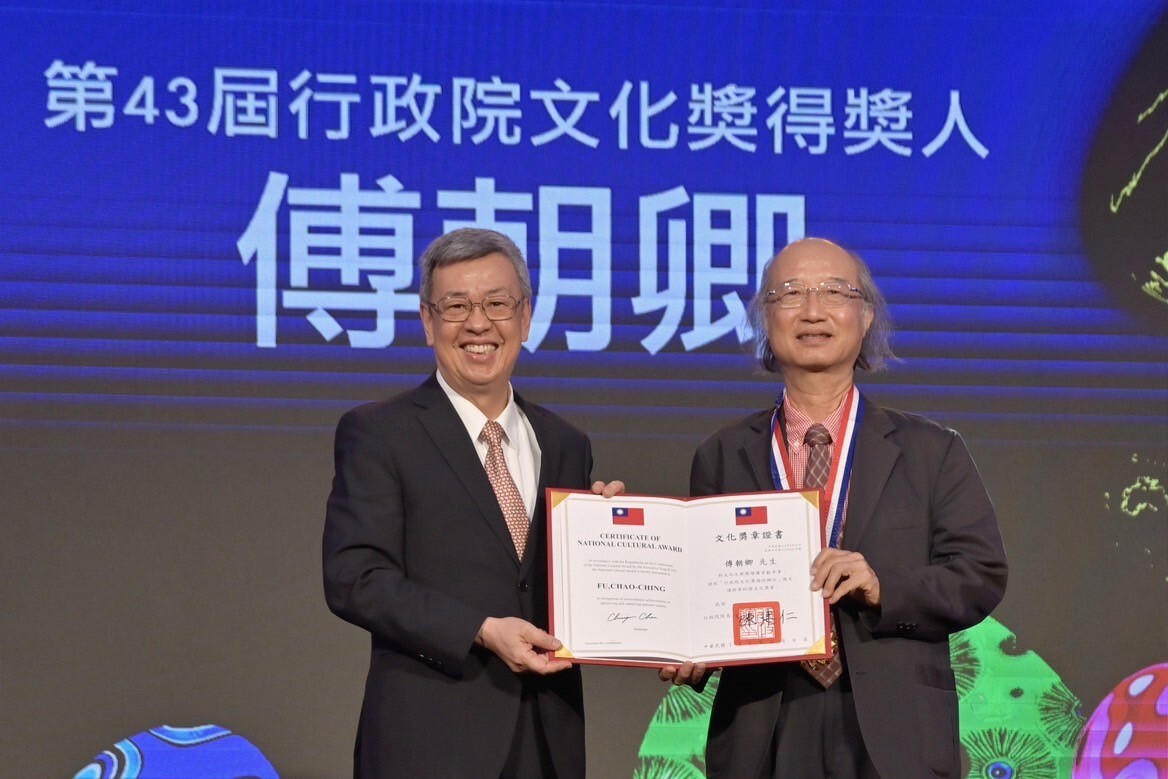
Professor Chao-Ching Fu was awarded the 43rd Executive Yuan National Cultural Award.
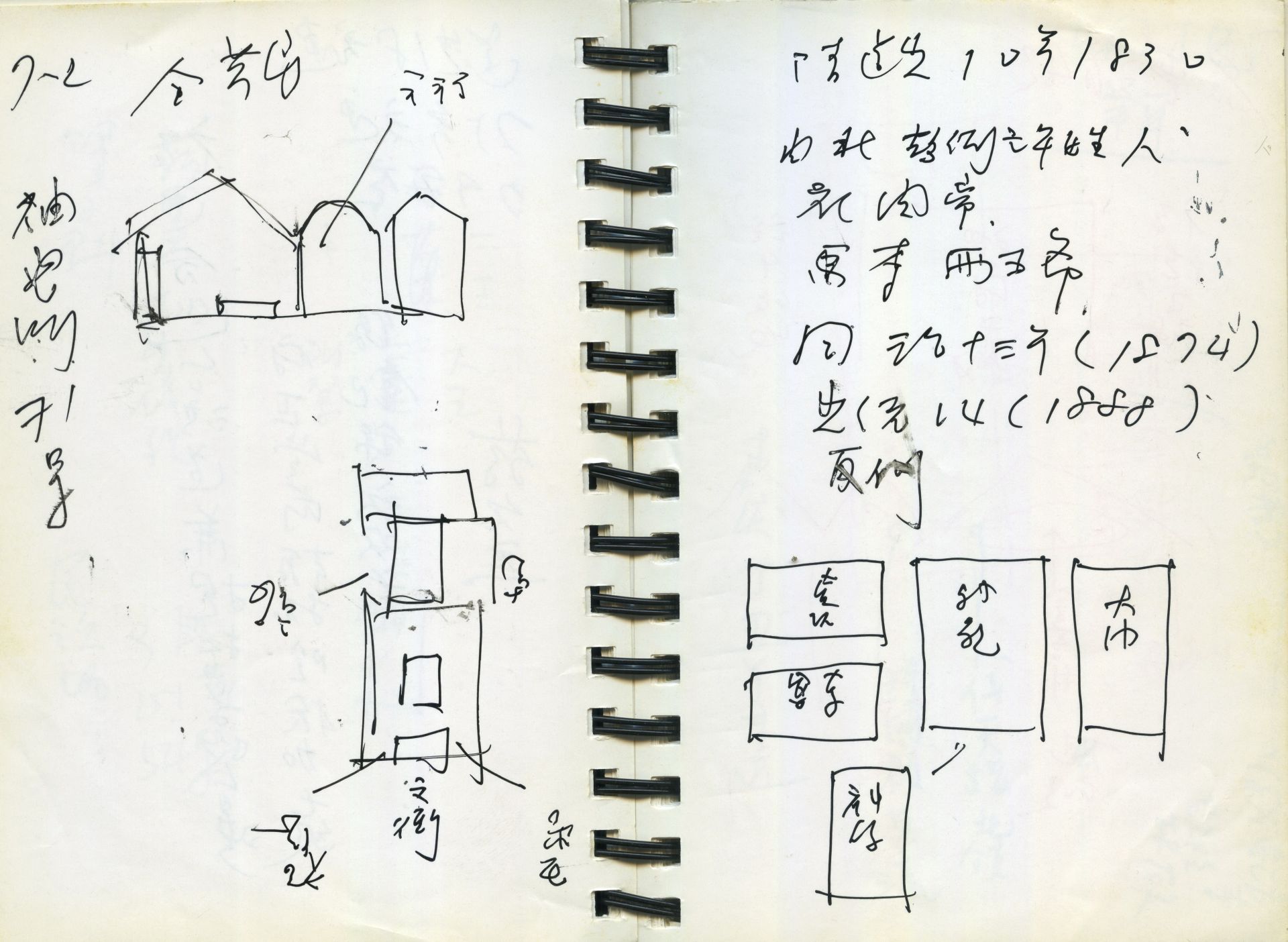
Professor Chao-Ching Fu's early research notes and essays.
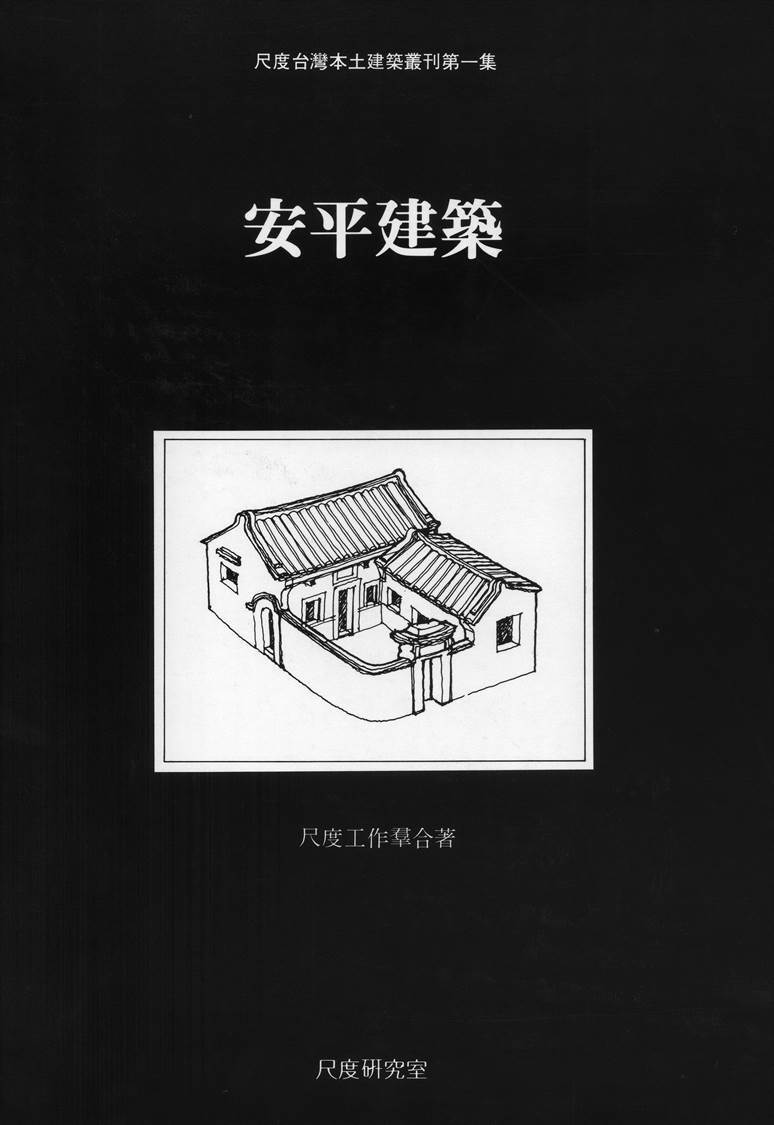
The earliest results of Professor Chao-Ching Fu leading students in research were documented in the book "Anping Architecture."
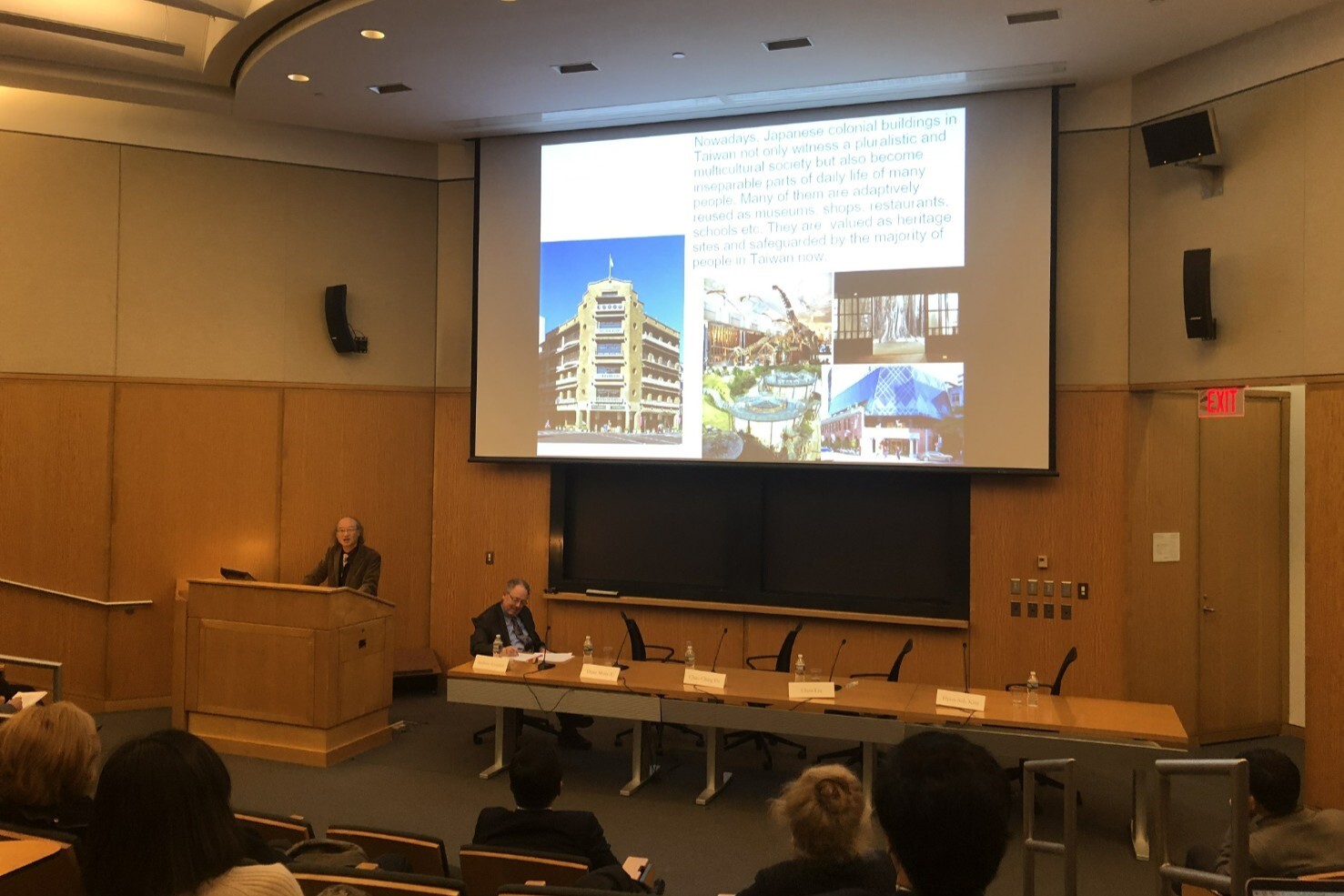
In 2019, Professor Chao-Ching Fu participated in the Colonial Architecture Heritage Forum at Harvard University in the United States.
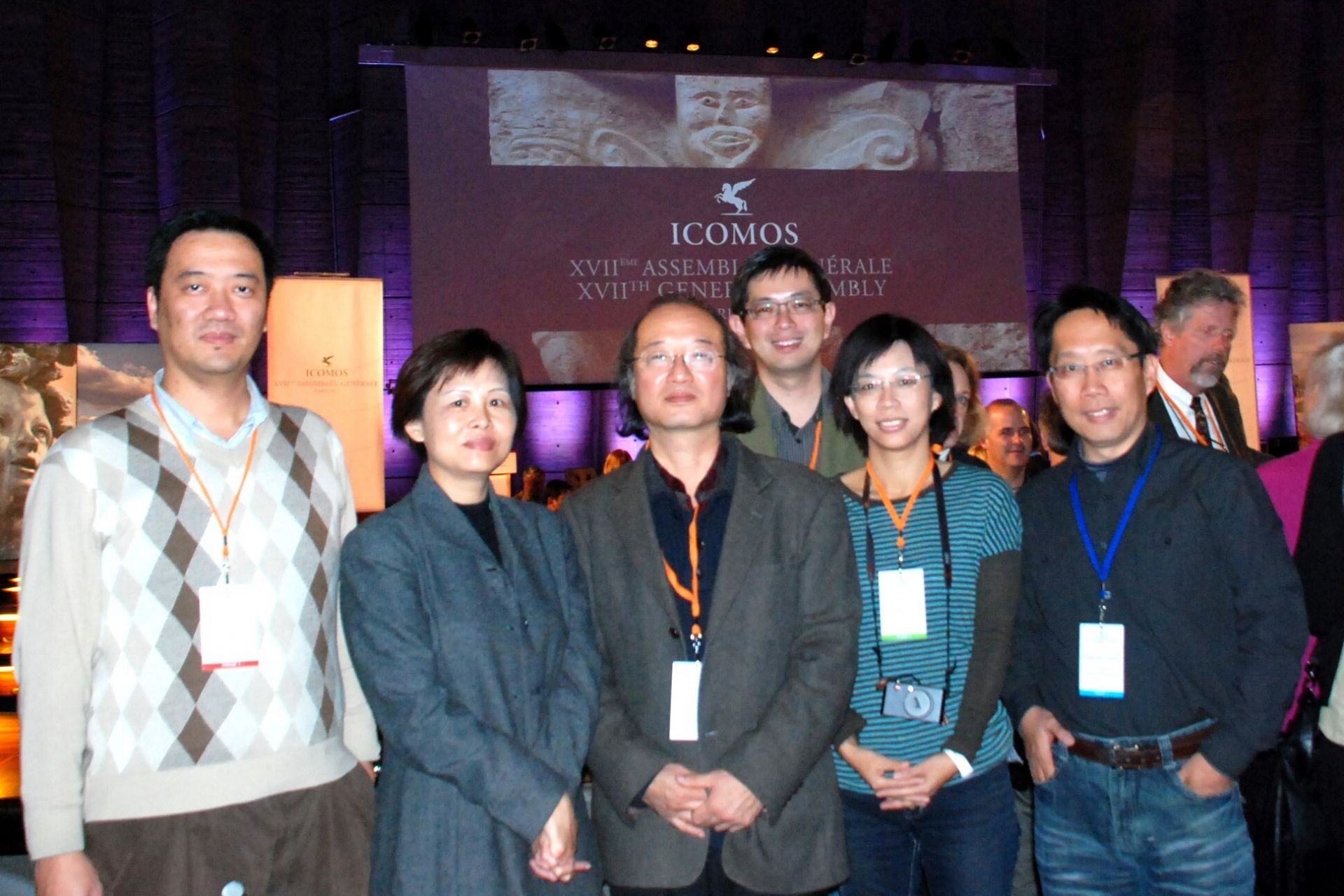
In 2011, Professor Chao-Ching Fu led students to attend the UNESCO ICOMOS conference.
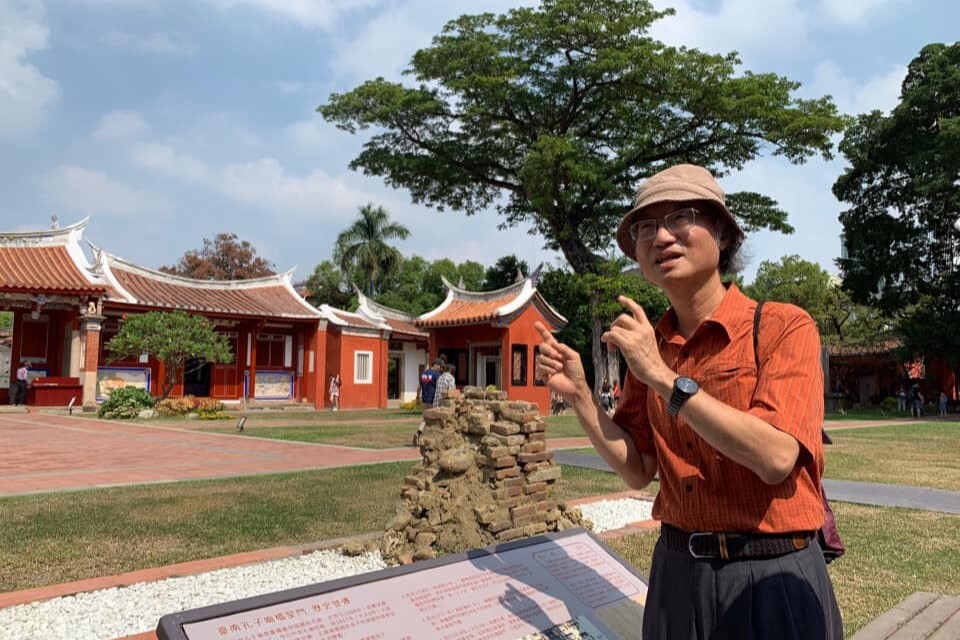
Professor Chao-Ching Fu often conducts cultural tours for the public in Taiwan.





